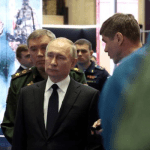President Vladimir Putin has signed a law authorising authorities to seize the assets of anybody convicted of “discrediting” and spreading “fake news” about the military.
The wartime legislation also allows for the seizure of money and other valuables from people found guilty of instigating “extremist” activities and advocating for “anti-Russian” sanctions.
In contrast to Soviet-era legislation, the statute does not appear to mention real estate as an asset vulnerable to confiscation.
The Kremlin stated Wednesday that there were “no grounds” for the people to be concerned about the new confiscation law, and it denied any links to its Soviet predecessor.
Both houses of Russia’s parliament had passed the bill swiftly and unanimously over the past two weeks before it reached Putin’s desk.
State Duma Speaker Vyacheslav Volodin on January 31 said that the new measures sought tougher punishments for “traitors” and “scoundrels” who oppose Russia’s invasion of Ukraine.
Russian authorities outlawed criticism of the military shortly after the February 2022 invasion.
The charge of spreading “fake news” about the army carries a maximum jail sentence of up to 15 years and has been used by the authorities to stifle nearly all forms of dissent.
Thousands of critics of the war have fled abroad to evade prosecution, with many leaving behind assets in Russia.













